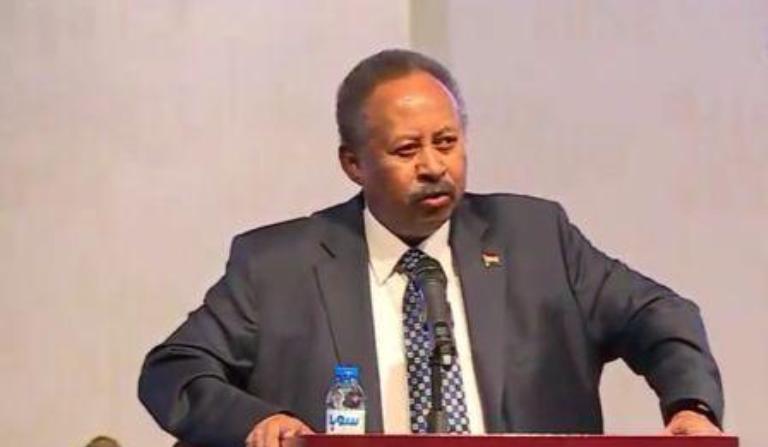Sudan’s revolution is the result of civilian-military alliance: Hamdok says

December 25, 2019 (KHARTOUM) – Prime Minister Abdallah Hamdok stressed that the Sudanese revolution is a result of the alliance between civilians and military and called to preserve this national unity and to work together to lay the foundations for a democratic regime in the country.
Hamdok made his call during a speech to the Sudanese people during a celebration at the Friendship Hall in Khartoum of the first anniversary of the revolution that toppled the Bashir regime last April.
The event was attended by the leaders of the ruling Forces for Freedom and Change (FFC) the cabinet members and a crowd of citizens who interrupted him repeatedly chanting slogans of support to the revolution.
In his speech, he was keen to underline the reforms implemented by his government during the past three months to deal with the internal challenges facing the country.
He also spoke about the government’s efforts to achieve justice, stressing that there is no prescription for the killing of civilians, land crimes and genocide. He also said the government was keen to hold accountable the perpetrators of the attack on the pro-democracy sit-in and the prosecution of all those who killed the civilians.
“We will ensure that all criminals who have authorized the killing of young women and men are tried and to restore the dignity of the victims’ families” he added.
Ismail Altaj, FFC representative in his speech called to hold accountable all who involved in the crimes committed against the protesters outside the army headquarters on 3 June 2019.
The military leadership and the military component of the transitional government did not take part in the event.
However, Hamdok was keen to underline their role in the collapse of the former regime when they decided to unseat him and to arrest him and his main aides or political allies on 11 April after more than four months of protests in the country.
He said that the Sudanese revolution is a “model of national consensus” and it is the product of a broad national alliance in which women and youth played in a “superheroic role”.
“The Sudanese model is based on a partnership between civilians and the military to build a democratic state and the rule of law,” he stressed.
“At this important historical moment, we would like to pay tribute to the role of all the regular forces in protecting democracy, as they have previously sided with the revolutionary choices of our people,” he added.
“The democratization process is accompanied by many challenges and serious complexities requiring to preserve this national unity, which was the reason for the success of our glorious revolution,” he concluded.
The issue of military participation in the transitional unity was one of the major obstacles that hindering the normalization of relation with the United States and Sudan’s removal from the list of state sponsors of terrorism.
The Sudanese Prime Minister has reportedly succeeded to convince Washington that the support of the international community to his civilian-led government is crucial to ensure the neutrality of the military component during the three-year transitional period.
The military say their role will be limited to protect the country and contribute to achieving peace in Sudan.
(ST)
